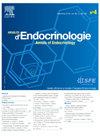典型 21-羟化酶缺乏症患者的 CRF1 和促肾上腺皮质激素拮抗剂
IF 2.9
3区 医学
Q3 ENDOCRINOLOGY & METABOLISM
引用次数: 0
摘要
超生理剂量的糖皮质激素常用于21-羟化酶缺乏症(21OHD),以控制肾上腺雄激素和类固醇前体的产生。通过阻断促肾上腺皮质激素释放因子1型受体(CRF1)或促肾上腺皮质激素受体来减少促肾上腺皮质激素的分泌,可以使用更多生理剂量的糖皮质激素。黑色素皮质素 2 型受体(MC2R,或 ACTH 受体)拮抗剂可阻断肾上腺上的 ACTH,具有类似的效果。这三种新原理已被用于药物开发,目前正处于不同阶段。最近公布的 21OHD 最大的随机对照 3 期试验数据显示,口服 CRF1 拮抗剂 crinercerfont 在控制肾上腺雄激素和类固醇前体方面有很好的效果,同时能将糖皮质激素降至生理范围。与之竞争的另一种 CRF1 拮抗剂 tildercerfont 在一项随机对照 3 期试验中没有显示出令人信服的结果,该试验已提前终止。MC2R拮抗剂Atumelnant(CRN04894)刚刚公布了在21OHD患者中进行的一项开放标签、剂量探索性2期研究的初步结果,结果令人鼓舞,而ACTH受体拮抗剂Lu AG13909目前正在21OHD患者中进行1期试验。本文章由计算机程序翻译,如有差异,请以英文原文为准。
CRF1 and ACTH antagonists in patients with classic 21-hydroxylase deficiency
Supraphysiological replacement doses of glucocorticoids are commonly used in 21-hydroxylase deficiency (21OHD) to be able to control the adrenal androgen and steroid precursor production. By reducing the ACTH production by blocking the corticotropin-releasing factor type 1 receptor (CRF1) or the ACTH receptor more physiological glucocorticoid doses can be used. Melanocortin type 2 receptor (MC2R, or ACTH receptor) antagonist block ACTH on the adrenals and has a similar effect. These three novel principles have been used in drug development and are currently in different phases. The data from the largest randomized controlled phase 3 trial in 21OHD have recently been published showing that crinercerfont, an orally administered CRF1 antagonist, has very good effect in controlling the adrenal androgens and steroid precursors while lowering the glucocorticoids into the physiological range. The competitor tildercerfont, another CRF1 antagonist, did not show convincing results in one of their randomized control phase 3 trials which was prematurely terminated. Atumelnant (CRN04894), a MC2R antagonist has just presented the initial results from an open-label, dose-finding phase 2 study in patients with 21OHD with encouraging results while Lu AG13909, an ACTH receptor antagonist, currently is trialed in a phase 1 study in patients with 21OHD.
求助全文
通过发布文献求助,成功后即可免费获取论文全文。
去求助
来源期刊

Annales d'endocrinologie
医学-内分泌学与代谢
CiteScore
4.40
自引率
6.50%
发文量
311
审稿时长
50 days
期刊介绍:
The Annales d''Endocrinologie, mouthpiece of the French Society of Endocrinology (SFE), publishes reviews, articles and case reports coming from clinical, therapeutic and fundamental research in endocrinology and metabolic diseases. Every year, it carries a position paper by a work-group of French-language endocrinologists, on an endocrine pathology chosen by the Society''s Scientific Committee. The journal is also the organ of the Society''s annual Congress, publishing a summary of the symposia, presentations and posters. "Les Must de l''Endocrinologie" is a special booklet brought out for the Congress, with summary articles that are always very well received. And finally, we publish the high-level instructional courses delivered during the Henri-Pierre Klotz International Endocrinology Days. The Annales is a window on the world, keeping alert clinicians up to date on what is going on in diagnosis and treatment in all the areas of our specialty.
 求助内容:
求助内容: 应助结果提醒方式:
应助结果提醒方式:


